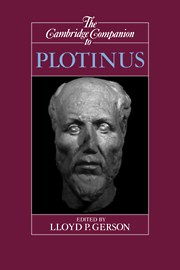Book contents
- Frontmatter
- Introduction
- 1 Plotinus
- 2 Plotinus's metaphysics of the One
- 3 The hierarchical ordering of reality in Plotinus
- 4 On soul and intellect
- 5 Essence and existence in the Enneads
- 6 Plotinus on the nature of physical reality
- 7 Plotinus on matter and evil
- 8 Eternity and time
- 9 Cognition and its object
- 10 Self-knowledge and subjectivity in the Enneads
- 11 Plotinus
- 12 Human freedom in the thought of Plotinus
- 13 An ethic for the late antique sage
- 14 Plotinus and language
- 15 Plotinus and later Platonic philosophers on the causality of the First Principle
- 16 Plotinus and Christian philosophy
- Bibliography
- Index
4 - On soul and intellect
Published online by Cambridge University Press: 28 May 2006
- Frontmatter
- Introduction
- 1 Plotinus
- 2 Plotinus's metaphysics of the One
- 3 The hierarchical ordering of reality in Plotinus
- 4 On soul and intellect
- 5 Essence and existence in the Enneads
- 6 Plotinus on the nature of physical reality
- 7 Plotinus on matter and evil
- 8 Eternity and time
- 9 Cognition and its object
- 10 Self-knowledge and subjectivity in the Enneads
- 11 Plotinus
- 12 Human freedom in the thought of Plotinus
- 13 An ethic for the late antique sage
- 14 Plotinus and language
- 15 Plotinus and later Platonic philosophers on the causality of the First Principle
- 16 Plotinus and Christian philosophy
- Bibliography
- Index
Summary
Readers of the Companion who have arrived at this chapter should be well aware of the fact that Plotinus was a Platonist. One might add that in spite of the fact that he has always been regarded as the founder of Neoplatonism, he himself would not have known what the Greek equivalent of that word might have meant, since all the Platonists of late antiquity regarded themselves as Platonists tout simple, and their philosophy as the exposition of the underlying truths of Plato's philosophy which Plato himself sometimes omitted to make explicit. The degree of self-deception involved in this selfconcept is perhaps nowhere clearer than in their discussions of soul and intellect. That is so because, while their conception of soul (psuchê) was fundamentally Platonic and dualist, their explanation of its operations owed much more to Aristotle and other post-Platonic philosophers than it did to Plato himself.
For Plotinus the dualism was as clear, if not as clear-cut. Though he was aware of materialistic theories of the nature of the soul, such as those of the Stoics, he was hostile to them and would have had little time for the great volume of modern discussion which goes under labels like materialism, physicalism, or functionalism. That is equally true for those theories which, under headings like epiphenomenalism and supervenience, allow for other than fully materialist explanations of what Plotinus would have seen as the most important functions of the soul and intellect - the thinking functions of mind.
- Type
- Chapter
- Information
- The Cambridge Companion to Plotinus , pp. 82 - 104Publisher: Cambridge University PressPrint publication year: 1996
- 6
- Cited by



